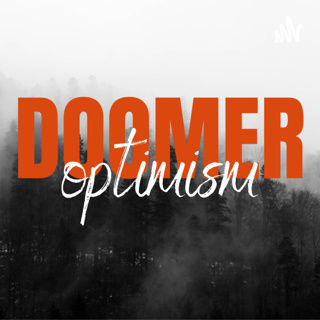
DO 289 - Beef, Bartering, and the Agorist's Guide to Not Starving with Nigel, Nate, and Jason
Nigel Best doesn’t have time for your bullshit. He’s too busy welding gates, rotating cattle, building spiral staircases, and conducting “illicit beef transactions” in Craigslist parking lots.Missouri woodworker and regenerative rancher Nigel Best joins Jason and Nate to talk about what it actually takes to make a living on the land—without going broke, without selling your soul, and without waiting for Washington to save you.In this episode:Why coming up hard isn’t a strategy (but flat tires and crooked fingers are part of the deal)The truth about rotational grazing: genius in wet years, dumbass in droughtsHow to raise beef when customers complain about prices and the president says you’re greedyThe case for land value tax as the only moral tax (and why nobody’s entitled to your heartbeats)Why the informal economy beats W-2 farms and digital surveillance every timeMeat packer monopolies vs. the last stand of independent ranchersTwo competing theories of change: political antitrust warfare or agorist opt-outWhy every kid should work construction with crotchety old men before graduating high schoolFair warning: Nigel solves exactly zero problems in this episode. What he does offer is three decades of hard-won wisdom from someone who’s actually been “out there in the rain at midnight with their hand up a cow.” No Instagram-perfect farm content. No verbatim regurgitation of regenerative ag books. Just the unvarnished reality of feeding yourself, your family, and your neighbors in a system designed to extract value from everyone who touches it.If you’re tired of influencers peddling theories and want to hear from someone who’s actually dragging their knuckles through it, this one’s for you.Guest: Nigel Best (@NigelBest5)Hosts: Jason & NateTopics: Regenerative Agriculture, Land Tax, Agorism, Beef Industry, Rural Economics, Informal Markets
13 Nov 1h 27min

DO 288 - Beyond Interchangeability: Leah Sargeant on the Dignity of Dependence
Why We Need Each Other More Than Everhttps://undpress.nd.edu/9780268210335/the-dignity-of-dependence/https://www.compactmag.com/article/the-great-feminization/Ashley welcomes back Leah Sargeant to discuss her new book, The Dignity of Dependence: A Feminist Manifesto. They explore two core arguments: that women's equality with men doesn't depend on being interchangeable with them, and that no humans are truly autonomous; we're all dependent on one another throughout our lives.The conversation moves from "doom" to optimism, examining how modern society tries to flatten sex differences and promote an illusion of self-reliance, particularly around pregnancy, motherhood, and the workplace. Leah critiques the approach of treating women as "defective men" who need to suppress their biology and feminine qualities to succeed in male-normed environments.Ashley and Leah discuss Helen Andrews' controversial essay on workplace feminization, the false ideal of the independent individual, and how this myth fails everyone—from infants to aging populations. They explore practical solutions, including community building, workplace flexibility, policy changes like baby bonuses and caregiver Social Security credits, and the importance of creating space for interdependence at every scale.The episode celebrates the seasons of life, the necessity of mutual dependence, and finding dignity in our need for one another, from the everyday juggling of school pickups and neighborhood networks to the profound vulnerabilities of pregnancy, illness, and aging.
11 Nov 59min

DO 287 - Graze Against the Machine: Breaking Up Big Ag, Rewilding America, and the Future of Food
Fresh from dinner with Wendell Berry in Kentucky, the crew discusses Paul Kingsnorth’s new book and the deep tensions in American agriculture. From Trump’s controversial beef deal with Argentina to the packing monopolies squeezing ranchers, we explore why our food system prioritizes industrial products over actually feeding people.Topics include: the soybean-ethanol scam, why 80% of corn never becomes human food, land prices and the return-to-the-land movement, the death of email jobs and rise of excess labor, and why California could have fed tens of millions on acorns and salmon alone. Plus: the case for a new agrarian think tank, the difference between living as creatures versus machines, and why we need a million cowboys to restore America’s ecosystems.Featuring reflections on nationalism vs. patriotism, the regulatory capture of agriculture, fiat currency, and farmland prices, and why the real abundance agenda has nothing to do with cheap beef from Argentina.
4 Nov 1h 9min

DO 286 - Building a Regenerative Landscaping Business with Tres of GreenBox Homes
Creating member networks, local food systems, and recession-proof community infrastructureJason talks with Tres, co-founder of GreenBox Homes, about creating a regenerative landscaping company that competes with traditional lawn care services. They discuss the business model of providing weekly yard care focused on building soil and ecosystems rather than just aesthetic maintenance, creating member networks for sharing plants and resources, and the massive supply-demand gap in the native plant industry.Tres shares how his Catholic faith informs his environmental mission, the potential for vertical integration through nurseries and material recovery, and his vision for a replicable, distributist model that could transform millions of acres. The conversation covers practical business strategy, the spiritual dimensions of working with land, and opportunities for others to enter the growing regenerative landscaping market.
28 Okt 1h 10min

DO 285 - AI and The 95% Extinction Threshold
AI safety researcher Nate Soares explains why he believes there's at least a 95% chance that current AI development will lead to human extinction, and why we're accelerating toward that outcome. Soares, who has been working on AI alignment since 2012, breaks down the fundamental problem: we're building increasingly intelligent systems without any ability to control what they actually want or pursue.The conversation covers current AI behavior that wasn't programmed: threatening users, keeping psychotic people in delusional states, and repeatedly lying when caught. Soares explains why these aren't bugs to be fixed but symptoms of a deeper problem. We can't point AI systems at any specific goal, not even something simple like "make a diamond." Instead, we get systems with bizarre drives that are only distantly related to their training.Soares addresses the "racing China" argument and why it misunderstands the threat. He explains why AI engineers can build powerful systems without understanding what's actually happening inside them, and why this matters. Using examples from evolutionary biology, he shows why there's no reason to expect AI systems to develop human-like morality or values.The discussion covers why a catastrophic warning event probably won't help, what international coordination could look like, and why current safety efforts fall short of what's needed. Soares is direct about industry motivations, technical limitations, and the timeline we're facing.Nate Soares has been researching AI alignment and safety since 2012. He works at the Machine Intelligence Research Institute (MIRI), one of the pioneering organizations focused on ensuring advanced AI systems are aligned with human values.
21 Okt 1h 33min

DO 284 - Group Chat Live
Join the Doomer Optimism crew for their first-ever live group chat as they tackle the big questions facing our technologically saturated world. Ashley, Nate, Jason, Peter, and Patrick gather to discuss Paul Kingsnorth’s new book Against the Machine, the creeping influence of AI in our daily lives, and whether we’re heading toward accelerated collapse or just another step down.The conversation meanders from the ethics of AI chatbots (including Amish farmers launching their own) to the practical realities of keeping phones away from kids in an increasingly digital world. Nate shares hard-won wisdom from rebuilding after his house fire, while Peter warns about the looming cattle market collapse that could reshape American agriculture. Jason makes the case for sheep, Ashley name-drops her upcoming dinner with Wendell Berry (yes, really), and everyone debates whether we should accelerate into the chaos or dig in our heels and resist.Topics covered: screen-free parenting strategies, the difference between tools and crutches, why COVID lockdowns weren’t all bad, the impossible economics of small-scale beef production, John Michael Greer’s stair-step collapse theory, and what it really takes to build resilience in an age of affluence and anxiety.Plus: Patrick performs a house tour nobody asked for, Nate explains why relationships matter more than bunkers, and the group grapples with whether the machine can ever truly be stopped—or if the best we can do is stay human despite it all.
14 Okt 1h 29min

DO 283 - Kevin Ryan's Grassroots Run for Illinois
Ashley talks with Kevin Ryan, a Marine Corps veteran and public school teacher running for U.S. Senate in Illinois without corporate donors, consultants, or ad buys. Kevin describes his campaign from a converted school bus as he travels to all 102 counties, gathering signatures by hand and talking directly with voters about what they want from their government. The two discuss money in politics, disillusionment with both parties, and how cynicism erodes civic life. It’s a grounded look at whether a government of the people, by the people, for the people can still function and what it takes to test that idea in real time.
7 Okt 57min

DO 282 - John Heers and Ashley on Learning Humility from Georgian Dinners and Forgotten Villages
Against efficiency and isolation: learning humility from forgotten communities and the ancient art of the Georgian feastJohn Heers, founder of First Things Foundation, joins Ashley to discuss his unconventional approach to international development—sending people to live humbly in forgotten communities from Mozambique to Guatemala, learning local languages, and facilitating indigenous entrepreneurship rather than imposing Western solutions.The conversation weaves through the tyranny of "spreadsheet brain," the spiritual necessity of smallness over ego, and why efficiency isn't a virtue in itself. John introduces the Georgian supra—a traditional dinner built around ritualized toasting that creates communion without demanding psychological intimacy—and explains how this ancient social technology is resonating with Americans hungry for something beyond transactional relationships.John and Ashley explore how face-to-face gathering, shared meals, and acknowledging life's difficult realities (including death and sin) are essential acts of resistance against a machine culture that wants us isolated, autonomous, and always online.John and Ashley will be hosting a Georgian supra together at the next Doomer Optimism gathering in Red Boiling Springs, Tennessee, February 13-14, 2025. We hope that you're able to join us!
30 Sep 1h 16min





















